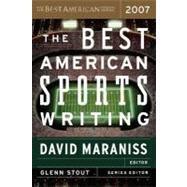
Note: Supplemental materials are not guaranteed with Rental or Used book purchases.
Purchase Benefits
What is included with this book?
| Foreword | p. xi |
| Introduction | p. xvii |
| The White Coon | p. 1 |
| from Field & Stream | |
| Bugs Bunny, Greatest Banned Player Ever | p. 7 |
| from USS Mariner.com | |
| Ready for Some Fútbol? | p. 22 |
| from Texas Monthly | |
| The Game of the Year | p. 28 |
| from Sports Illustrated | |
| Filling in the Pieces of Jake Scott | p. 42 |
| from The South Florida Sun-Sentinel | |
| Fading Away | p. 54 |
| from ESPN.com | |
| Deal of the Century | p. 63 |
| from The (Torrance, California) Daily Breeze | |
| An Unknown Filly Dies, and the Crowd Just Shrugs | p. 81 |
| from The New York Times | |
| Let Us Now Raze Famous Men | p. 84 |
| from Sports Illustrated | |
| Only Medal for Bode Is Fool's Gold | p. 104 |
| from The Washington Post | |
| That Which Does Not Kill Me Makes Me Stranger | p. 107 |
| from The New York Times Play Magazine | |
| Polite When in Neutral | p. 120 |
| from The New York Times Play Magazine | |
| Snook | p. 131 |
| from The New Yorker | |
| Blank Monday | p. 144 |
| from The New Yorker | |
| What Keeps Bill Parcells Awake at Night | p. 159 |
| from The New York Times Play Magazine | |
| The Madness of John Chaney | p. 181 |
| from Philadelphia Magazine | |
| The Real Deal in So Many Ways | p. 192 |
| from The Washington Post | |
| $neaker War | p. 196 |
| from The Boston Globe | |
| Baseball for Life | p. 225 |
| from The New York Times Play Magazine | |
| A New Game Plan | p. 240 |
| from The Washington Post Magazine | |
| The Saturday Game | p. 261 |
| from ESPN.com | |
| Playing 4 Keeps | p. 282 |
| from Chicago Magazine | |
| The Ultimate Assist | p. 293 |
| from SI.com | |
| In Iraq, Soccer Field Is No Longer a Refuge | p. 304 |
| from The Los Angeles Times | |
| A Moment of Silence | p. 309 |
| from Runner's World | |
| Team Hoyt Starts Again | p. 322 |
| from Runner's World | |
| The Big Show by Little People | p. 337 |
| from The Los Angeles Times Magazine | |
| Talking Turkey | p. 346 |
| from The New Yorker | |
| Contributors' | |
| Notes | p. 359 |
| Notable Sports Writing of 2006 | p. 365 |
| Table of Contents provided by Publisher. All Rights Reserved. |
The New copy of this book will include any supplemental materials advertised. Please check the title of the book to determine if it should include any access cards, study guides, lab manuals, CDs, etc.
The Used, Rental and eBook copies of this book are not guaranteed to include any supplemental materials. Typically, only the book itself is included. This is true even if the title states it includes any access cards, study guides, lab manuals, CDs, etc.
Excerpted from The Best American Sports Writing 2007 by David Maraniss
All rights reserved by the original copyright owners. Excerpts are provided for display purposes only and may not be reproduced, reprinted or distributed without the written permission of the publisher.